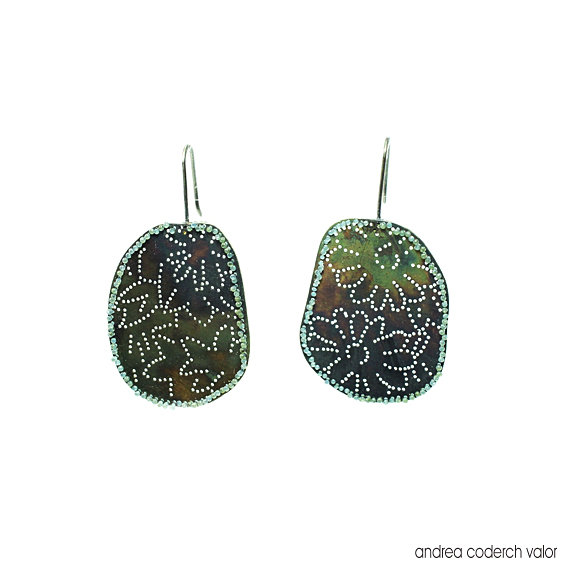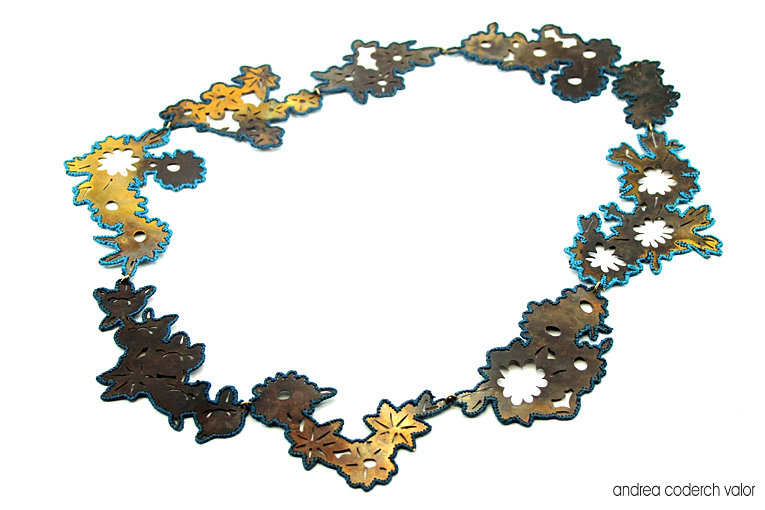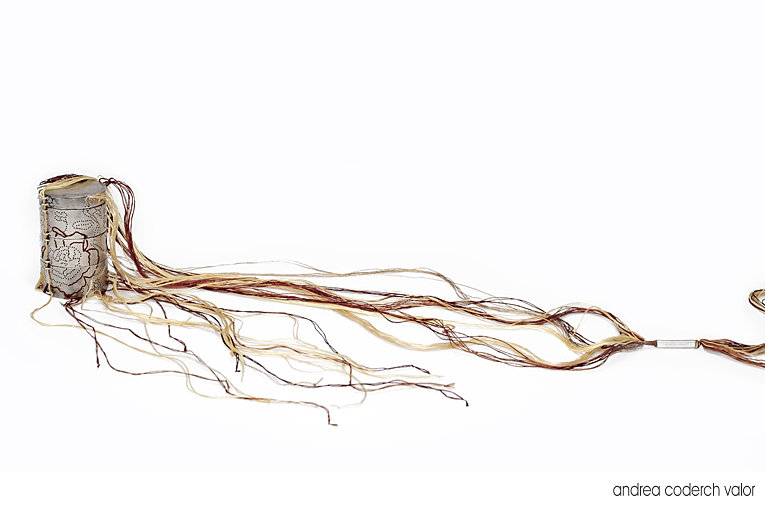Petit point après petit point, petit trou après petit trou, lentement retracer le souvenir … (cf collection « Querida Yun » d’Andrea Coderch Valor)
le temps du souvenir,
le temps de la mémoire,
le temps de l’apprentissage,
le temps de faire,
avec patience, méticulosité, amour ….
ainsi tisse le temps ….
et la beauté ultime, souvent reste trésor caché (le dos du bijou étant souvent encore plus beau que le devant …)
From 2011, at Alchimia school, some projects began their life under the Peter Bauhuis & Doris Maninger guidance :
The Hana Collection : Japanese kimono flowers are the source of inspiration for the Hana Collection. Once a silhouette was selected a series of jewelry techniques were applied to transfer the design from fabric to metal. With the same care and attention as can be seen in many Japanese art forms I applied the same delicacy to each individual piece. Gold, Silver, Shibuichi (a Japanese alloy), wood, silk and nylon thread are the materials in which I worked in to represent my vision of Japan.
The « Querida Yun » Collection : « Dear Yun: We have known each other since I was born but we have never met. I want to fill up the space between us by making a piece per day dedicated to you. It is time to go further, not only with the written words. I know you are very old and feel tired, but wait a little bit more, I am finally coming to visit you. Your friend that loves you. Andrea ».
The result ? at first a letter each day, with the result of 150 brooches. One per day during 6 months. (2012 Gold, silver, japanese fabrics). and then, more and more jewels. FANTASTIC jewels !
 Andrea Coderch Valor – brooch – 2011 – FRONT – . Silver, wood, silk
Andrea Coderch Valor – brooch – 2011 – FRONT – . Silver, wood, silk
 Andrea Coderch Valor – brooch – 2011 – BACK – . Silver, wood, silk
Andrea Coderch Valor – brooch – 2011 – BACK – . Silver, wood, silk
 Andrea Coderch Valor – 2011. Silver, wood (bois de violet), silk.
Andrea Coderch Valor – 2011. Silver, wood (bois de violet), silk.



Andrea Coderch Valor – ring 2011- Hana collection Silver, wood, silk.

 Andrea Coderch Valor – Yoroi 2013. Brazalete. Shibuichi, seda, algodón / 2013.Bracelet. Shibuichi, silk, cotton
Andrea Coderch Valor – Yoroi 2013. Brazalete. Shibuichi, seda, algodón / 2013.Bracelet. Shibuichi, silk, cotton
 Andrea Coderch Valor - 2012. Shibuichi, silk, – coll. ‘Querida Yun’
Andrea Coderch Valor - 2012. Shibuichi, silk, – coll. ‘Querida Yun’
 Andrea Coderch Valor – brooch – 2011 – Front – Silver, shibuichi, steel, silk.
Andrea Coderch Valor – brooch – 2011 – Front – Silver, shibuichi, steel, silk.
 Andrea Coderch Valor - 2011. BACK. Gold, silver, shibuichi, coral, charcoal, silk
Andrea Coderch Valor - 2011. BACK. Gold, silver, shibuichi, coral, charcoal, silk
 Andrea Coderch Valor – 2011. FRONT. Gold, silver, shibuichi, coral, charcoal, silk.
Andrea Coderch Valor – 2011. FRONT. Gold, silver, shibuichi, coral, charcoal, silk.
 Andrea Coderch Valor – necklace 2011.FRONT. Gold, shibuichi, onix, charcoal, plastic wire.
Andrea Coderch Valor – necklace 2011.FRONT. Gold, shibuichi, onix, charcoal, plastic wire.
 Andrea Coderch Valor - 2011. FRONT. Gold, shibuichi, onix, charcoal, plastic wire.
Andrea Coderch Valor - 2011. FRONT. Gold, shibuichi, onix, charcoal, plastic wire.
 Andrea Coderch Valor - 2011 – BACK . Gold, shibuichi, onix, charcoal, plastic wire.
Andrea Coderch Valor - 2011 – BACK . Gold, shibuichi, onix, charcoal, plastic wire.
 Andrea Coderch Valor - Untitled 2013. Silver, wood, japanese fabric, silk 2013. /Plata, madera, tela japonesa, seda
Andrea Coderch Valor - Untitled 2013. Silver, wood, japanese fabric, silk 2013. /Plata, madera, tela japonesa, seda

 Andrea Coderch Valor – 2014 brooches (back) Track-slow-down Gold, silver, copper, wood, japanese lacquer, cotton
Andrea Coderch Valor – 2014 brooches (back) Track-slow-down Gold, silver, copper, wood, japanese lacquer, cotton
 Andrea Coderch Valor - 2012. Shibuichi, silk, paper – coll. ‘Querida Yun’
Andrea Coderch Valor - 2012. Shibuichi, silk, paper – coll. ‘Querida Yun’

 Andrea Coderch Valor – caja de lagrimas – pendant – « Querida Yun » 2012 – shibuichi, silk – DETAIL
Andrea Coderch Valor – caja de lagrimas – pendant – « Querida Yun » 2012 – shibuichi, silk – DETAIL
Shibuichi (四分一?) is an alloy which can be patinated into a range of subtle muted shades of blue or green, through the use of rokushō treatments. Its name means « one-fourth » in Japanese and indicates the standard formulation of one part silver to three parts copper, though this may be varied according to the desired effect. A 5% silver / 95% copper alloy is also marketed as « shibuichi ».[1] A wide range of colours can be achieved using the whole range of alloy compositions, even above 50% silver. 90% Copper and 10% Silver for a dark grey and down to 70% Copper and 30% Silver for lighter greys.[2]It is a common misconception that both copper and silver oxides form, but in fact a detailed study has shown that only copper oxides are formed on the copper rich regions of the material’s microstructure, while the silver rich regions are left largely untouched.[citation needed]
For most of its history, shibuichi was mostly used to ornament various fittings for katana until the Meiji reforms, when most swordmakers began to make purely decorative objects instead. The material is often used in mokume-gane combinations. Similar alloys have been used elsewhere but the use of shibuichi to achieve different colored patinas appears to have remained nearly unknown outside Japan, until recent interest from artisans in the West. (Wikipedia)